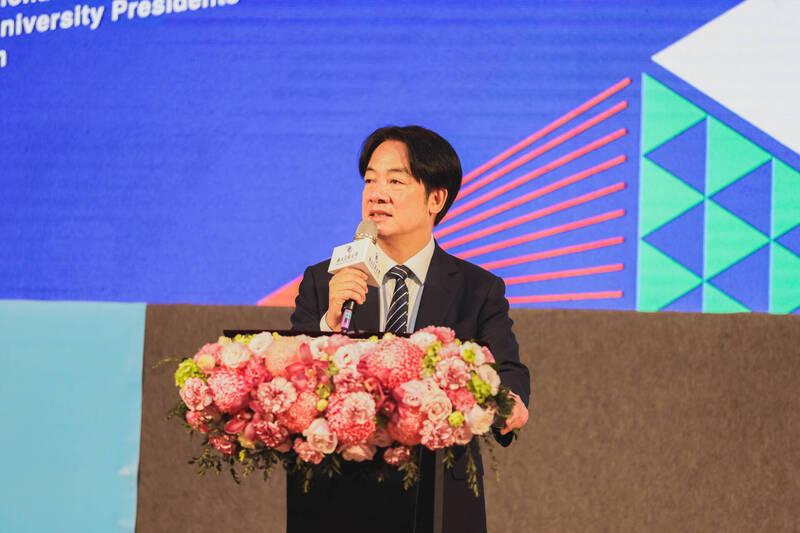Taiwan’s democracy and academic independence are invaluable, and universities should be cautious about exchanges with China, President William Lai (賴清德) said today at an academic conference in Yilan.
He made the comments at the 2025 National Conference for the University Presidents of Taiwan, the same week as officials warned about Chinese Communist Party (CCP) attempts to influence Taiwanese university students and blacklisted two Chinese universities.
Minister of Education Cheng Ying-yao (鄭英耀) yesterday said Taiwanese institutions would be banned from collaborating with Huaqiao University in Xiamen and Quanzhou, as well as Jinan University in Guangzhou after national security officials found that both schools are under the direct control of the CCP political warfare bureau.

Photo courtesy of the Ministry of Education
Additionally, during an eight-day educational trip in China's Sichuan Province for Taiwanese students on Tuesday last week, China’s Taiwan Affairs Office Deputy Director Wu Xi (吳璽) told participants they should oppose Taiwanese independence and advocate for the good of the Chinese people.
A government official speaking on condition of anonymity warned that such trips are part of “united front” tactics by the CCP.
Lai laid out four key goals for Taiwan’s educational sector — ensuring that no student is left behind, promoting collaborative development among universities, encouraging innovation in higher education and increasing government support for institutions.
The Ministry of Education must allocate resources to provide equal opportunities for all students, even those from rural areas; ensure universities are fostering interdisciplinary talent, promote new possibilities for academic development, support students in pursuing international experiences and assist in setting up private-public collaborations, Lai said.
One of the initiatives Lai cited was the Taiwan Global Pathfinders Initiative, to which the government has allocated NT$10 billion (US$306 million) to fund opportunities for Taiwanese youth to travel overseas.
To raise awareness of national defense among the entire population, the Presidential Office established the Whole-of-Society Defense Resilience Committee, Lai said.
Regarding China, Lai said that institutions must be aware of the risks and join the government in protecting the country’s core key technologies, research and competitiveness.
Taiwan’s freedom and democratic way of life are “precious” assets, Lai added.

Taiwanese can file complaints with the Tourism Administration to report travel agencies if their activities caused termination of a person’s citizenship, Mainland Affairs Council Minister Chiu Chui-cheng (邱垂正) said yesterday, after a podcaster highlighted a case in which a person’s citizenship was canceled for receiving a single-use Chinese passport to enter Russia. The council is aware of incidents in which people who signed up through Chinese travel agencies for tours of Russia were told they could obtain Russian visas and fast-track border clearance, Chiu told reporters on the sidelines of an event in Taipei. However, the travel agencies actually applied

Japanese footwear brand Onitsuka Tiger today issued a public apology and said it has suspended an employee amid allegations that the staff member discriminated against a Vietnamese customer at its Taipei 101 store. Posting on the social media platform Threads yesterday, a user said that an employee at the store said that “those shoes are very expensive” when her friend, who is a migrant worker from Vietnam, asked for assistance. The employee then ignored her until she asked again, to which she replied: "We don't have a size 37." The post had amassed nearly 26,000 likes and 916 comments as of this

New measures aimed at making Taiwan more attractive to foreign professionals came into effect this month, the National Development Council said yesterday. Among the changes, international students at Taiwanese universities would be able to work in Taiwan without a work permit in the two years after they graduate, explainer materials provided by the council said. In addition, foreign nationals who graduated from one of the world’s top 200 universities within the past five years can also apply for a two-year open work permit. Previously, those graduates would have needed to apply for a work permit using point-based criteria or have a Taiwanese company

The Shilin District Prosecutors’ Office yesterday indicted two Taiwanese and issued a wanted notice for Pete Liu (劉作虎), founder of Shenzhen-based smartphone manufacturer OnePlus Technology Co (萬普拉斯科技), for allegedly contravening the Act Governing Relations Between the People of the Taiwan Area and the Mainland Area (臺灣地區與大陸地區人民關係條例) by poaching 70 engineers in Taiwan. Liu allegedly traveled to Taiwan at the end of 2014 and met with a Taiwanese man surnamed Lin (林) to discuss establishing a mobile software research and development (R&D) team in Taiwan, prosecutors said. Without approval from the government, Lin, following Liu’s instructions, recruited more than 70 software